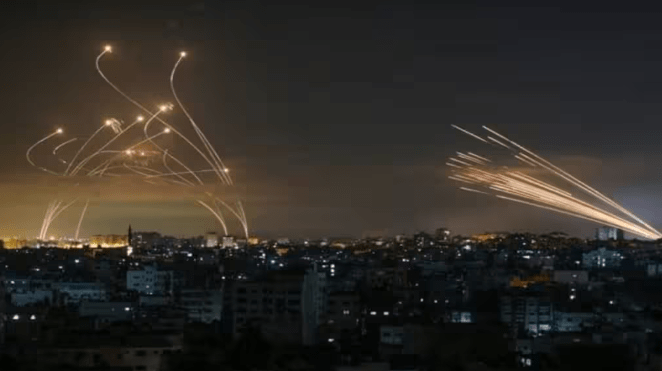
Iran has made it clear that last night’s airstrikes against Israel have ended. The head of Iran’s army has announced it personally. Now all eyes are on Israel to see if they will take any major action against Iran. Because for the first time, Iran has attacked Israel openly and directly.
On the night of April 13, Iran carried out a series of airstrikes against Israel. Iran is believed to have carried out these attacks using between 200 and 300 drones and ballistic missiles. Iran’s paramilitary force, the Islamic Revolutionary Guard Corps (IRGC), carried out these attacks. This is the first time that Iran has openly admitted that it has attacked Israel. Before this, Israel had always claimed that Iran attacked through its proxy terrorist organizations, Hamas, Hezbollah and the Houthi rebels.
The air attack
It was in retaliation for an attack on the Iranian Consulate in the Syrian capital, Damascus, in which a senior IRGC commander was killed.
But the question is whether Iran’s revenge is complete?
Because the Chief of the Iranian Army, Major General Bagheri, has announced the end of the operation against Israel. Major General Bagheri said that the IRGC has only attacked Israeli military bases, no residential areas or economic establishments have been damaged. Among these military bases, Iran claims that the Israel Intelligence Center (intelligence base) and the Nevatim Air Base on the border with Syria are from where the attack on the Iranian Consulate in Damascus was carried out.
However, the Iranian Army Chief has definitely threatened that if Israel attacks again, it would also receive an appropriate response. This country has also announced the end of its operations in the United Nations (UN).
The world on alert
Now the eyes of the world are on Israel to see if Iran will be attacked again. However, Israel itself has claimed that 99 percent of Iran’s drone and missile attacks were intercepted in the sky and destroyed. The Israel Defense Forces (IDF) say Iran’s strikes have not caused any significant damage, except for minor damage to an air base.
The US Department of Defense (Pentagon) has stated that as soon as it became known that Iran had carried out airstrikes against Israel, US air defense systems were activated in countries such as Iran and Jordan and missiles, including drones, were destroyed in the sky. The British Royal Forces also reportedly played an important role in countering these attacks.
The IDF issued a statement saying that the Israeli Air Defense System and the Arrow Air Defense System, with the help of their allies (America, Britain, etc.), had intercepted dozens of aircraft (drones) and cruise missiles before they could attack Israeli territory. The IDF released a video of the F-35I Adir fighter jet and said the operation continues at Nevatim air base, and dozens of its fighter jets are still operating to be able to deal with any airstrike.
Israel was fully prepared
Learning from the Hamas drone attack on October 7 last year, Israel has strengthened its air defense system extremely robustly, capable of intercepting 200 to 300 drone and missile attacks simultaneously.
Regarding the April 13 attack, Iran has said that this is neither a counterattack nor a retaliatory action by Iran. Israel has always been under threat from that country. This time, the Islamic power has emerged from the shadows. That is, before Iran used to carry out attacks against Israel through its proxy terrorist organizations, Hamas, Hezbollah and the Houthi rebels, this time it has done it by itself.
The impact of the conflict in India
The conflict between Iran and Israel, marked by deep-rooted geopolitical and ideological tensions, casts a long shadow over global diplomacy. Nuclear ambitions and regional dominance are at the heart of this conflict, which has sparked numerous clashes over the decades.
An Israeli airstrike hit a building next to the Iranian embassy in the Syrian capital of Damascus on April 1, 2024, killing senior commander Mohammad Reza Zahedi and Brigadier General Mohammad Hadi Haj Rahimi, along with five other officers. The IRGC declared that ‘Iran reserves its legitimate and inherent right under international law and the Charter of the United Nations to take a decisive response to such reprehensible acts,’ Zahra Ershadi, Iran’s ambassador to the United Nations, told the Secretary General. from the ONU.
Animosity between Iran and Israel
“The animosity between Iran and Israel is primarily fueled by Israel’s concerns over Iran’s nuclear program and its support for anti-Israel groups such as Hezbollah and the Houthis. Iran’s support for Hamas is well known, and these Iranian proxies have been waging war by other means in the Persian Gulf.
On the other hand, Iran views Israel as an illegitimate state and a close ally of its main adversary, the United States. The conflict has gone through several phases, from covert operations targeting nuclear scientists to direct confrontations in neighboring countries,” explains Lieutenant Colonel Manoj K Channan, Indian Army Veteran.
Will it have a direct impact on India?
Channan says: ‘India is in a delicate position, maintaining strong ties with both Israel and Iran. Israel is a major arms supplier to India and a key partner in technology and agriculture. On the other hand, Iran has been a significant source of oil for India and a crucial access point to Central Asia and Afghanistan.’
Iran – Israel – proxies of global powers
“USA. is committed to supporting Israel’s security concerns. In recent months, Iran’s relations with Russia and China have gained new momentum, as both powers seek ways to influence the Middle East region in opposition to Western powers. Iran’s partnership with these nations goes beyond mere economic cooperation; It extends to military and technological collaborations.
The holding of joint military exercises, the signing of trade agreements in sectors ranging from energy to infrastructure signal a strategic alignment that challenges the dominance of Western influence in the region. This trilateral cooperation will upset the balance of power,” believes Lieutenant Colonel (retd) Channan.
Broader Implications for India
In his view, beyond the direct economic and diplomatic impacts, the conflict between Iran and Israel influences India’s broader strategic interests in the Middle East. The region is home to millions of Indian expatriates whose remittances are vital to India’s economy. Although not expected at this time, any significant escalation of the conflict will jeopardize their livelihoods and cause a complex logistical challenge of repatriation.
She is a senior journalist working at The Financial Express Publications. In a career spanning nearly three decades, she has covered diplomatic and strategic affairs, as well as the defense and aerospace sectors. She is an expert in Latin America and the Caribbean.
Source: https://reporteasia.com/opinion/2024/04/15/conflicto-entre-israel-e-iran-implicancias-para-la-diplomacia-y-los-intereses-estrategicos-de-la-india/

